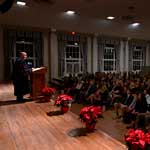
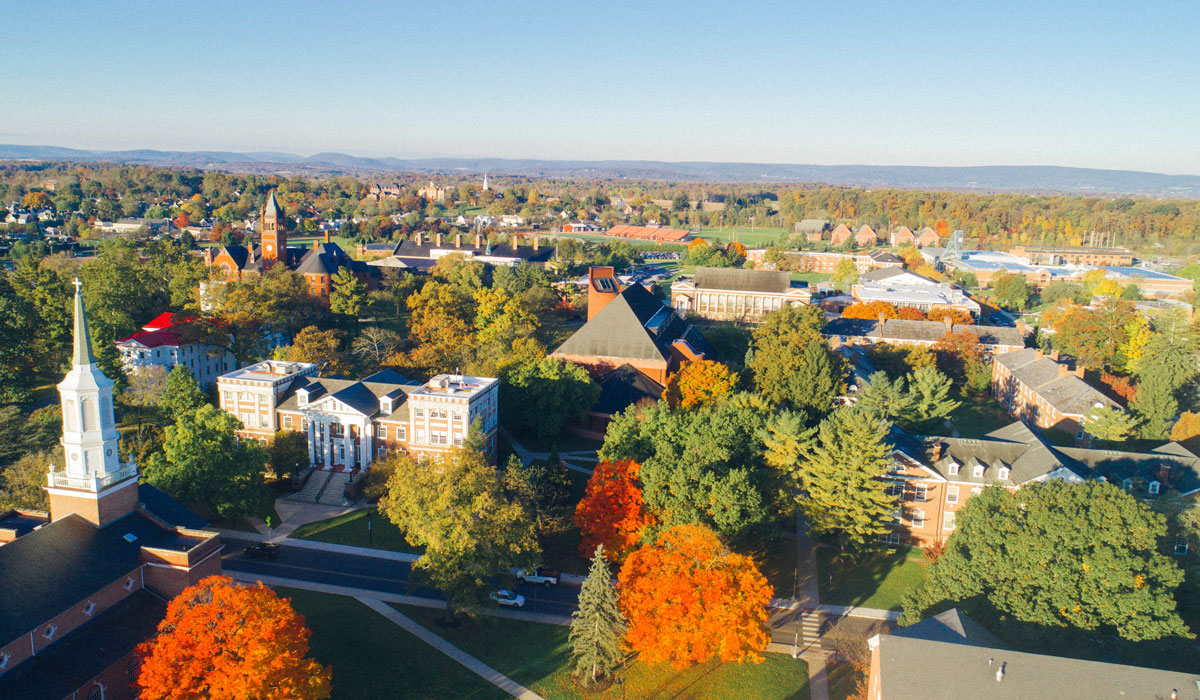
At Gettysburg College, each faculty member—from those who are newly-hired to those who have earned the honor of tenure—shares an excitement about education and a desire to make meaningful contributions to the College’s intellectual climate through the courses they teach, the relationships they build with their students, and the research opportunities they pursue with curiosity and passion.
This academic year, we recognize the milestones of 20 passionate professors—16 of whom joined the Gettysburg community to embark on their first year of teaching at the College and four who earned the honor of tenure.
Below, read more about the scholarly interests and achievements of our talented tenured faculty and find a list of our newest faculty members.
Newly-tenured faculty
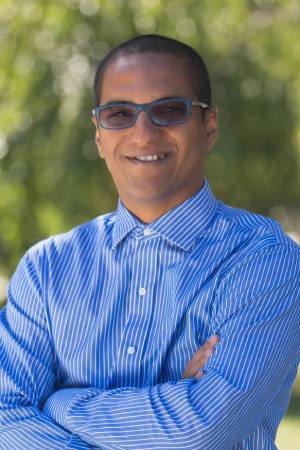
Mathematics Prof. Ricardo Conceição
Prof. Ricardo Conceição was born in Feira de Santana, Bahia, Brazil, where, as a child, he dreamed of being an inventor, scientist, or journalist. That dream changed in his early teens when he discovered that there were people who studied mathematics for a living. He went on to earn his bachelor’s degree in math education from the State University of Feira de Santana in Brazil, a master’s of science in mathematics from Brazil’s Federal University of Pernambuco, and a doctorate from the University of Texas at Austin.
As an undergraduate student in Brazil, Conceição said he had great mentors but no concrete opportunity to do research in mathematics. One of the reasons he joined the Gettysburg College community was to provide to his students with the research experiences that his own circumstances denied him. “Since I got here, I have been impressed by the curiosity and diligence demonstrated by Gettysburg’s students. The work I do with them, in and out of the classroom, continues to inspire me as a teacher and researcher,” he said.
His research interests lie in algebra and number theory, focusing on finding explicit points on curves defined over function fields, the characterization and construction of special classes of polynomials over finite fields, and the construction of curves over finite fields with a large set of rational points. Lately, he has been interested in the interplay between the arithmetic of the ring of integers and that of the ring of polynomials over a field, since this area of research presents many opportunities in which to include undergraduate students.
Conceição feels lucky to be in a place where the commitment to teaching in the liberal arts remains alive. In the future, he would like to develop new courses in his research area and a first-year seminar connecting math and fiction or one titled “Mathbusters.”
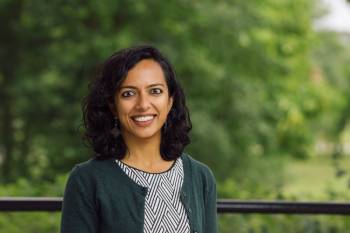 Psychology Prof. Sahana Mukherjee
Psychology Prof. Sahana Mukherjee
In addition to teaching psychology, Prof. Sahana Mukherjee is Chair of Interdisciplinary Studies at Gettysburg College. Her teaching and mentoring philosophy is based on the principles of action teaching, a pedagogical approach that contributes to social justice by encouraging students to live what they learn.
“I have enjoyed working closely with students in ways that I never got to experience as an undergraduate student in a larger institution: domestic and international trips with students to collect data or participate in an immersion trip, collecting data in the lab and in the field, sharing the highs and lows of analyzing data, and exploring new research questions. It is quite remarkable the kind of experiences that we can share with our students,” she said. “Through grant support from the Musselman Library and JCCTL, I have been able to develop activities and assignments that allow students to go beyond the classroom and make connections with social justice issues.”
Similar to her teaching, Mukherjee’s research focuses on topics of social justice with an emphasis on the role of cultural tools, such as museums and educational curricula, in the reproduction of privilege and disadvantage. She utilizes a diverse methodological toolkit—including qualitative and quantitative methods in the laboratory and in the field—to apply psychological theories to social issues in North America and South Asia.
Mukherjee serves on the Leadership Council of the Society for the Psychological Study of Social Issues, a division of the American Psychological Association that brings scientific research to impact public policy. She has also been recognized as an Exemplary Diversity Scholar by the National Center for Institutional Diversity at the University of Michigan, and is the 2020 recipient of the Luther W. and Bernice L. Thompson Distinguished Teaching Award.
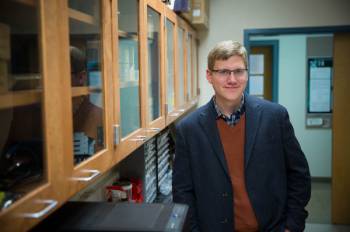 Physics Prof. James Puckett
Physics Prof. James Puckett
Prof. James Puckett earned his doctorate at North Carolina State University and went on to do postdoctoral research at Yale University. In his research, Puckett explores soft condensed matter physics, particularly connecting microscopic interactions with macroscopic behavior of complex systems, ranging from granular materials to collective animal behavior.
“My research focuses on some of the complex systems we encounter in everyday life: the sand or dirt under our feet, grains of salt pouring from shaker, the flock of birds changing direction and the traffic jam on your way to work,” he said. “While the interactions between individual components could be complex or even unknown, these interactions lead to predictable emergent behaviors and self-organized patterns.”
Most recently, he has worked alongside Julia Giannini ’18 to test the applications of statistical mechanics on an active matter system. The research duo published a paper this summer that detailed their findings.
Beyond his research pursuits, Puckett enjoys mentoring students, helping them develop lab skills, and cultivating their interests. “I was drawn to Gettysburg College not only for the incredible academic environment to conduct my own research, but also the extensive research opportunities available to students,” Puckett said. “It is very rewarding to have so many incredible students in my lab and classes.”
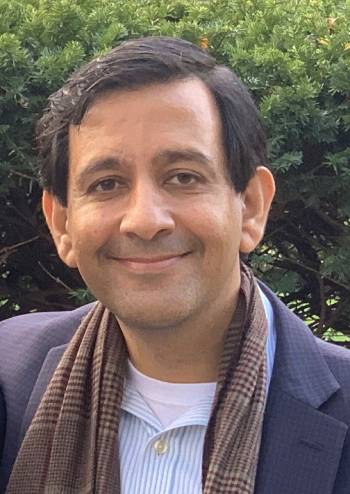 History Prof. Karim Samji
History Prof. Karim Samji
Prof. Karim Samji completed his doctorate at the University of Michigan, Ann Arbor and joined the Gettysburg College history department in the fall of 2014, specializing in Medieval Near Eastern History. His primary scholarly interests include historiography, hagiography, and narratology.
“As an historian, I not only provide my students with the relevant dates and facts, but I also equip them with the critical tools of historiography,” he said. “The central methodological tool I explain to students is source criticism. I challenge them to take the driver’s seat by analyzing original source material.”
In addition to teaching a wide range of history topics—including an introduction to Islamic history, the history of the Ottoman Empire, and scholarly approaches to scripture in higher criticism—Samji has also devoted close attention to curriculum development. “New courses and seminars allow me the opportunity to share my scholarship with students,” he said.
In the same spirit, Samji, a member of the International Qur’anic Studies Association, published a monograph in 2018, “The Qur'a¯n: A Form-Critical History,” which sheds light on the literary history of Late Antiquity—the period between Classical Antiquity and the Early Middle Ages. Furthermore, it explores the structural seams of the corpus coranicum and the literary history of the Qur'a¯n. Most recently, Samji’s research focuses on genre history, theory, and criticism.
Newly-hired faculty
- Sarah Bryant, Lecturer in Mathematics
- Ya-Wen Chuang, Visiting Assistant Prof. of Physics
- Jenna Craig, Visiting Assistant Prof. of Biology
- James Downs, Gilder Lehrman NEH Prof. of Civil War Era Studies
- Kirby Farah, Assistant Prof. of Anthropology
- Abigail Fredrickson, Visiting Assistant Prof. of Health Sciences
- Caitlin Hult, Assistant Prof. of Mathematics
- Jason Labonte, Visiting Assistant Prof. of Chemistry
- Jaein Lee, Visiting Assistant Prof. of Sociology
- Kevin Pham, Assistant Prof. of Political Science
- Xingyi Puckett, Visiting Assistant Prof. of Economics
- Emily Sahadeo, Visiting Assistant Prof. of Chemistry
- Jesse Cordes Selbin, Assistant Prof, of English
- Xin Tang, Assistant Prof. of Economics
- Elly Toyoda, Visiting Assistant Prof. of Music
- Ae Sil Woo, Assistant Prof. of Political Science
By Molly Foster
Photos by Miranda Harple and Shawna Sherrell, and courtesy of Karim Samji
Posted: 09/22/20


